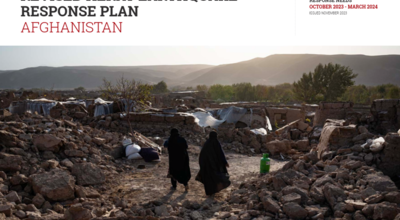One full year of no polio cases in the Southern Region of Afghanistan
KABUL - Afghanistan’s Southern Region has today, for the first time ever, reached one full year without any reported cases of wild poliovirus, giving a boost to the country’s fight against the crippling disease. This milestone will encourage the polio effort in the Eastern Region, which continues to fight an outbreak of polio that has seen nine cases reported so far this year.
Kandahar and Helmand have long been identified as the epicentres of polio in Afghanistan and the Southern Region as one of the most persistent reservoirs of poliovirus globally. This unprecedented progress is a sign of the effectiveness of the polio eradication strategies and their implementation in the Southern Region. It is also a testament to the commitment the of Government of Afghanistan, community representatives, partners and donor countries, and to the effective implementation of the National Emergency Action Plan’s innovative approaches to gain access to areas where children previously were not being reached with the oral polio vaccine.
At the same time, many areas of the country still have low levels of routine immunization coverage and it is now more important than ever that we all redouble our efforts to build the immunity of children across the country with polio vaccine to stop transmission of the virus. The Ministry of Public Health, WHO and UNICEF are committed to doing this.
“Passing one year without any reported cases of wild poliovirus in the Southern Region is an encouraging milestone and a great credit to the frontline health workers,” said Dr. Suraya Dalil, the Minister of Public Health. “I urge those workers to now redouble their efforts over the next few months of the low transmission season when transmission of the virus is traditionally slower. This offers a very real opportunity to stop transmission of the virus entirely across the country,” she said.
“This achievement is the result of the tireless work of the vaccinators, social mobilizers, health workers, community elders, religious leaders, media and most importantly the parents and caregivers of Kandahar and Helmand,” said Dr. Richard Peeperkorn, WHO Afghanistan Representative. “While we recognize and welcome this success we must remain vigilant and remember that Afghanistan is still fighting a polio outbreak in the Eastern Region and remains at serious risk of reinfection in the south.” he said.
“This is a timely reminder that the strategies and the tools we are using do work and that we can eradicate polio once and for all,” said Vidhya Ganesh UNICEF Afghanistan Representative a.i. “Central to this is a strong partnership for polio that is led by the government with a high level of community ownership. We all now need to work harder than ever to build the immunity of children across the country through oral polio vaccine but also to prevent the spread of the disease through healthier practices, including exclusive breastfeeding and better hygiene and sanitation.”
Efforts also continue across Afghanistan to strengthen the routine immunization system so that children are better protected from all vaccine-preventable diseases and to sustain achievements in polio eradication in the long term.
There were 37 polio cases in Afghanistan in 2012. To date, there have been 9 cases in the country in 2013 as a result of repeated cross-border wild polio virus importation and subsequent child-to-child transmission in Afghanistan.
For more information:
Ministry of Public Health: Dr Toufiq Mashal, DG, mtmashal@yahoo.com
WHO Afghanistan: Dr Akif Saatcioglu, saatcioglua@afg.emro.who.int; +93(0)790 690 642
UNICEF Afghanistan: Alistair Gretarsson; agretarsson@unicef.org; +93 (0) 79850 7110
 UN
UN







